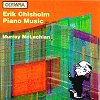One has to applaud
Dunelm and the excellent pianist Murray
McLachlan for their diligence as far
as the music of Erik Chisholm is concerned.
Glaswegian by birth, the music of his
native country of Scotland was to become
Chisholm’s creative spark. A pupil of
Tovey’s, it is interesting and amusing
to note that, according to John Purser’s
fine booklet note, Chisholm was dubbed
‘MacBartók’ for his ethnomusicological
endeavours and his translation of the
fruits of these labours into his own
characteristic form of expression.
All the works here
are rooted in the traditional music
of north-west Scotland, yet the tunes
act as a spring-board from which Chisholm
launches his imagination. The ‘True
Edge of the World’ is a reference to
the Hebrides. The melodies themselves
come almost exclusively from Amy Murray’s
‘Father Allan’s Island’.
Murray McLachlan plays
these jewel-like miniatures expressively,
with virtuosity when required, and always
with focus. He is as aware of the power
of the miniature as the composer himself
clearly was. The piano used has a crystal
clear treble faithfully rendered by
the excellent recording. Try the second
excerpt from the Preludes, entitled
‘Song of the Mavis’ to appreciate this
fully. It is good to follow the pieces
alongside John Purser’s booklet notes,
simply because he is so often spot-on
in his descriptions – the ‘dreamy luxuriance’
he refers to in ‘The Sheiling’ (No.
4) is exactly right, for example. The
idea of taking these themes and transforming
them, taking them to areas they might
otherwise never have travelled, obviously
appealed to Chisholm. He can also add
distinctly dark undercurrents, exposing
a revelatory layer of meaning that was
perhaps only just detectably latent
in the original. Similarly in No. 6,
Chisholm ‘takes his line for a walk’
into much darker regions.
Debussian, quasi-impressionistic
sound-painting is here too (try No.
19 – track 8 – ‘Stavaiging’), and it
feels good when Chisholm provides a
piece that is long enough for us to
immerse ourselves. A case in point is
the modal and very lovely No. 23, track
9, ‘Rudha Bàn’, where all credit
is due to McLachlan for not letting
the music just become a ‘wash’ of sound.
The Patrick MacDonald
Collection of Highland Vocal Airs was
published in 1784 and furnished Chisholm
with material for the second group on
this disc. The dissonant interjections
to the more simple prevailing setting
in No. 4 (‘Rubato’) are most appealing,
as is the No. 9 (track 19, ‘Andante
maestoso’) in its darkness. Interesting
that the pentatonics of No. 16 do not
imply any sort of orientalism. The piece
remains firmly geographically rooted
with its companion pieces.
There are some pieces
that meander rather, it has to be said;
Nos. 17 and 18 being cases in point.
However there is so much of interest
here that they appear as little ‘dips’
in the flow.
The final five movements
on the disc - there is a sixth which
is not recorded here - include a sweet
‘Skye Dance’ (a mere fifty seconds)
and a hyper-delicate ‘Mermaid’s Song’.
Personally I have not
heard any other discs by McLachlan of
Chishom’s music (there is a review
of Volume 1 on MusicWeb,
though. On the present evidence, that
will be well worthy of investigation,
too.
Colin Clarke
 MusicWeb
also has the last remaining stock of
MusicWeb
also has the last remaining stock of
ERIK
CHISHOLM Piano Music Murray McLachlan
Piano. Olympia OCD 639 MusicWeb SPECIAL
OFFER From Stock: £10 P&P
free Worldwide
See review
to purchase.

